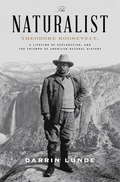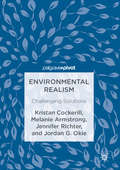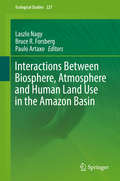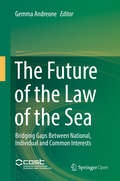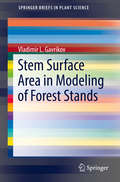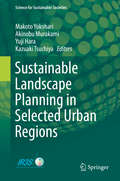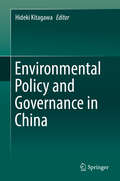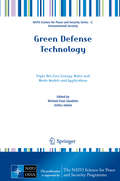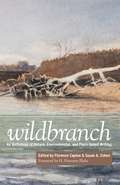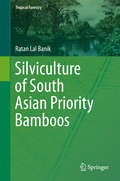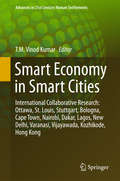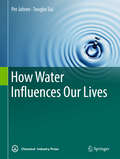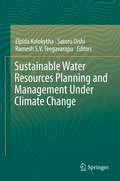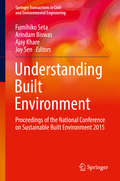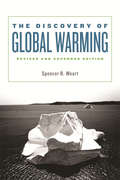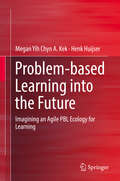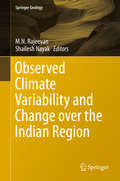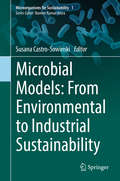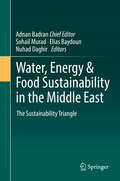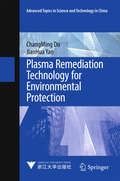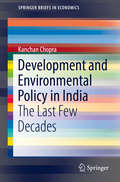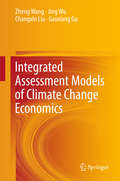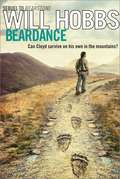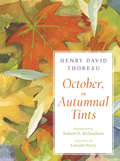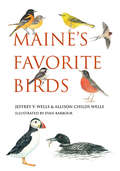- Table View
- List View
The Naturalist: Theodore Roosevelt, A Lifetime of Exploration, and the Triumph of American Natural History
by Darrin LundeA captivating new account of how Theodore Roosevelt’s lifelong passion for the natural world set the stage for America’s wildlife conservation movement and determined his legacy as a founding father of today’s museum naturalism No U.S. president is more popularly associated with nature and wildlife than is Theodore Roosevelt—prodigious hunter, tireless adventurer, and ardent conservationist. We think of him as a larger-than-life original, yet in The Naturalist, Darrin Lunde has firmly situated Roosevelt’s indomitable curiosity about the natural world in the tradition of museum naturalism. As a child, Roosevelt actively modeled himself on the men (including John James Audubon and Spencer F. Baird) who pioneered this key branch of biology by developing a taxonomy of the natural world—basing their work on the experiential study of nature. The impact that these scientists and their trailblazing methods had on Roosevelt shaped not only his audacious personality but his entire career, informing his work as a statesman and ultimately affecting generations of Americans’ relationship to this country’s wilderness. Drawing on Roosevelt’s diaries and travel journals as well as Lunde’s own role as a leading figure in museum naturalism today, The Naturalist reads Roosevelt through the lens of his love for nature. From his teenage collections of birds and small mammals to his time at Harvard and political rise, Roosevelt’s fascination with wildlife and exploration culminated in his triumphant expedition to Africa, a trip which he himself considered to be the apex of his varied life. With narrative verve, Lunde brings his singular experience to bear on our twenty-sixth president’s life and constructs a perceptively researched and insightful history that tracks Roosevelt’s maturation from exuberant boyhood hunter to vital champion of serious scientific inquiry.From the Hardcover edition.
Environmental Realism
by Melanie Armstrong Kristan Cockerill Jennifer Richter Jordan G. OkieThis interdisciplinary book challenges current approaches to "environmental problems" that perpetuate flawed but deeply embedded cultural beliefs about the role of science and technology in society. The authors elucidate and interrogate a cultural history of solutionism that typifies expectations that science can, should, and will reduce risk to people and property by containing and controlling biophysical phenomena. Using historical analysis, eco-evolutionary principles, and case studies on floods, radioactive waste, and epidemics, the authors show that perceived solutions to "environmental problems" generate new problems, leading to problem-solution cycles of increasing scope and complexity. The authors encourage readers to challenge the ideology of solutionism by considering the potential of language, social action and new paradigms of sustainability to shape management systems. This book will appeal to scholars in multi- and interdisciplinary fields such as Environment Studies, Environmental Science, Environmental Policy, and Science, Technology, and Society Studies.
Interactions Between Biosphere, Atmosphere and Human Land Use in the Amazon Basin
by Laszlo Nagy Bruce R. Forsberg Paulo ArtaxoThis book offers apanorama of recent scientific achievements produced through the framework of theLarge-Scale Biosphere-Atmosphere programme (LBA) and other research programmesin the Brazilian Amazon. The content is highly interdisciplinary, with an overarchingaim to contribute to the understanding of the dynamic biophysical andsocietal/socio-economic structure and functioning of Amazonia as a regionalentity and its regional and global climatic teleconnections. The targetreadership includes advanced undergraduate and post-graduate students andresearchers seeking to untangle the gamut of interactions that the Amazon's complexbiophysical and social system represent.
The Future of the Law of the Sea
by Gemma AndreoneThis book is open access under a CC BY-NC 4. 9 license. It explores the diverse phenomena which are challenging the international law of the sea today, using the unique perspective of a simultaneous analysis of the national, individual and common interests at stake. This perspective, which all the contributors bear in mind when treating their own topic, also constitutes a useful element in the effort to bring today's legal complexity and fragmentation to a homogenous vision of the sustainable use of the marine environment and of its resources, and also of the international and national response to maritime crimes. The volume analyzes the relevant legal frameworks and recent developments, focusing on the competing interests which have influenced State jurisdiction and other regulatory processes. An analysis of the competing interests and their developments allows us to identify actors and relevant legal and institutional contexts, retracing how and when these elements have changed over time.
Stem Surface Area in Modeling of Forest Stands
by Vladimir L. GavrikovThis book reveals the benefits of describing and modeling trees as the combined surface areas of their stems, and provides a concise overview of the fundamental grounds for adopting such an approach. Anatomically speaking, trees are largely thin sheaths of living cells and it is this understanding that has sparked growing interest in the study of stem surface areas in trees and stands. An overview of publications on analytical methods for the dynamics and structure of forest stands based on stem surface area is also provided. The approach described here gives readers a chance to rethink some models that were popular for decades, while also offering a glance into future research. The application of a simple geometrical model of a forest stand has made it possible to reexamine a highly promising model, the self-thinning rule, which has been a subject of a protracted discussion for the past few decades. Further, the analysis presented here can serve as the basis for predicting forest stand increments, a topic that calls for further development.
Sustainable Landscape Planning in Selected Urban Regions
by Makoto Yokohari Akinobu Murakami Yuji Hara Kazuaki TsuchiyaThis book provides a unique contribution to the science of sustainable societies by challenging the traditional concept of rural-urban dichotomy. It combines environmental engineering and landscape sciences perspectives on urban region issues, making the book a unique work in urban study literatures. Today's extended urban regions often maintain rural features within their boundaries and also have strong social, economic, and environmental linkages with the surrounding rural areas. These intra- and inter- linkages between urban and rural systems produce complex interdependences with global and local sustainability issues, including those of climate change, resource exploitation, ecosystem degradation and human wellbeing. Planning and other prospective actions for the sustainability of urban regions, therefore, cannot solely depend on "urban" approaches; rather, they need to integrate broader landscape perspectives that take extended social and ecological systems into consideration. This volume shows how to untangle, diagnose, and transform urban regions through distinctive thematic contributions across a variety of academic disciplines ranging from environmental engineering and geography to landscape ecology and urban planning. Case studies, selected from across the world and investigating urban regions in East Asia, Europe, North America and South-East Asia, collectively illustrate shared and differentiated drivers of sustainability challenges and provide informative inputs to global and local sustainability initiatives.
Environmental Policy and Governance in China
by Hideki KitagawaThis book focuses on how to create an environmentally friendly society in China from the viewpoint of environmental law and policy. The authors accessed a great number of valuable sources not available in English, and interviewed various scholars and public officials, in order to analyze the environmental policies in China while comparing some of the features to Japan. The book stresses the importance of introducing a brand-new policy of central and local government, and analyses why these policies have not been executed effectively in the local society. In addition to the economy-oriented policy and spirit of the Chinese nation, which are the main causes, this book also highlights shortcomings in the inspection system, information management, and the extremely low degree of public participation as important aspects to focus on in order to tackle the current problems. The individual chapters will help readers to understand the environmental issues in China in depth, and provide guidance on resolving the issues in China and in developing countries that are now or soon will be facing the challenge of combining economic growth and environmental improvement. Air, water and soil pollution are serious challenges in China. The deterioration of the environment often leads to rioting that influences social stability, which is also a great concern to foreign investors. This book will be of interest to a professional audience such as policymakers, journalists, members of environmental NGOs, managers and employees who do business with China, as well as academic researchers and students.
Green Defense Technology
by Sirkku Juhola Michael Evan GoodsiteThis book focuses on the ways in which military installations and small cities can implement and integrate triple net planning and energy, water, and waste sustainability strategies into broad installation operational management, arrive at the best decision, create policy and communicate effectively to stakeholders. It explores current and emerging technologies, methods, and frameworks for energy conservation, efficiency, and renewable energy within the context of triple net zero implementation practice. Recognizing that the challenge extends beyond finding technological solutions to achieve triple net zero outcomes, the contributions also address the need for a systemic view in the planning phase, as well as adequate communication and policy measures and incentives.
Wildbranch: An Anthology Of Nature, Environmental, And Place-based Writing
by Susan A. Cohen Florence CaplowWildbranch: An Anthology of Nature, Environmental, and Place-based Writing is a powerful collection of mostly unpublished essays and poetry by both prominent American environmental writers and exciting new voices. The poetry and essays by more than fifty contributors offer the reader glimpses into places as diverse as a forest in West Africa, the moors of Ireland, the canyons of the Sonoran desert mountains, and the fields of New England, and they reflect the varied perspectives of field biologists, hunters, farmers, environmental educators, wilderness guides, academics, writers, and artists. The collection is an intimate portrait of the natural world drawn through the wisdom, ecological consciousness, and open hearts of these exceptional contributors. The Wildbranch Writing Workshop, cosponsored by Orion magazine and Sterling College, has encouraged thoughtful natural history, outdoor, and environmental writing for more than twenty years.
Silviculture of South Asian Priority Bamboos
by Ratan Lal BanikThis monographaims at bringing out a comprehensive collection of information on bamboovarieties in South Asia. The main focus of this book is to address theecological and economic significance of bamboos. Bamboo is a versatile group of plants, capable of providing ecological,economic and livelihood security to the people. In the tropics, especially therural areas in different countries of South Asia, most of the houses aremade of bamboos. In the hilly areas of Bangladesh, Bhutan, Nepal and India, thetribal people take bamboo shoots as one of their major food items sinceprehistoric days. With palatableshoots and grass like leaves bamboo plants have also been liked by many herbivore animals, such as, elephants,the wild cattle, Indian Bison, and some speciesof deer. The red-panda in the Himalayas, and primates,pigs, rats and mice, porcupines, and squirrels are also incidental feeders onsoutheast Asian bamboos. There has been a growing awareness in recent years about the values ofbamboo being an important means of economic growth and for improving thesocio-economic conditions of the rural poor. Bamboo as an industrialmaterial can substitute wood and that to at low cost. Due to increasing demandand squeezing of bamboo area the plants have been overexploited and the qualityand quantity of resource alarmingly getting depleted. Besides many new bamboobased industries have come up which also urgently require uninterrupted supplyof species wise bamboo resource. The south Asia region has bestowed with more than 300 bamboospecies with enormous diversities at species, ecological and geneticallevel. A number of bamboo species are found common among countriesof the region selected for various utilization potentials having wide range of ability to adjustenvironmental conditions of these countries and thus prioritized forcultivation. Both government and private planters in the region have started allocating funds, land andother logistics to raise large scale plantation of desired bamboospecies. This book has been drafted to find out answers of the most pertinentqueries based on the field observations on each of the bamboo species andknowledge learnt from the indigenous people living with bamboos in differentparts of south-east and south Asian countries. This monograph would beinteresting and useful to bamboo professionals, foresters, horticulturists,field level extension workers, nurserymen, planters, industrial entrepreneurs,ecologists, and valuable source of reference to the relevant researchers andstudents in the region.
Smart Economy in Smart Cities
by T. M. Vinod KumarThe present book highlights studies that show how smart cities promote urban economic development. The book surveys the state of the art of Smart City Economic Development through a literature survey. The book uses 13 in depth city research case studies in 10 countries such as the North America, Europe, Africa and Asia to explain how a smart economy changes the urban spatial system and vice versa. This book focuses on exploratory city studies in different countries, which investigate how urban spatial systems adapt to the specific needs of smart urban economy. The theory of smart city economic development is not yet entirely understood and applied in metropolitan regional plans. Smart urban economies are largely the result of the influence of ICT applications on all aspects of urban economy, which in turn changes the land-use system. It points out that the dynamics of smart city GDP creation takes 'different paths,' which need further empirical study, hypothesis testing and mathematical modelling. Although there are hypotheses on how smart cities generate wealth and social benefits for nations, there are no significant empirical studies available on how they generate urban economic development through urban spatial adaptation. This book with 13 cities research studies is one attempt to fill in the gap in knowledge base.
How Water Influences Our Lives
by Per Jahren Tongbo SuiThis beautifully illustrated book explains how water influences our culture; the many phases of water from ice to gas, its simple but still so unpredictable nature, and water resources on Earth; how water is distributed in ice, oceans, rivers, lakes and more; how it creates transport possibilities; how it produces and absorbs energy; how it is constantly changing the surface of the Earth; how there is enough water on Earth, yet sometimes there is too much or too litt≤ the role of water in recreation; and how water supplies us with food in a myriad of ways. Few things are like water - a subtle and thought-provoking element, so simple and yet complicated, so conspicuous yet unpredictable, so soft and peaceful yet powerful, and so universal yet unique. Water is by far the world's largest commodity. Though it belongs to all of us, it is still not shared by all. We very seldom take time to reflect on the many ways that water affects our lives. Though it would be too ambitious to believe that it claims all the meanings and roles of water, this book, by showcasing water's versatility and by sharing the experiences and insights gained by the two authors during their many travels across the globe, contributes to a greater awareness of the most important substance in our society - water. The book offers an insightful and intriguing read for anyone interested in science and culture related to water, from laymen to students and decision-makers.
Sustainable Water Resources Planning and Management Under Climate Change
by Elpida Kolokytha Satoru Oishi Ramesh S.V. TeegavarapuThis book discusses different aspects of water resources, ranging from hydrology and modeling to management and policy responses. Climate changes and the uncertainty of future hydrological regimes make sustainable water resources management a difficult task, requiring a set of approaches that address climate variability and change. The book focuses on three main themes: hydrological changes, adaptive decision-making for water resources, and institutional analysis and risk management. It discusses the applications and limitations of climate change models and scenarios related to precipitation projection, which predicts to the future availability of water. It also offers interesting examples from around the globe to describe the policy options for dealing with climate change. Addressing emerging issues that need to be resolved and techniques that can be applied for sustainable climate-change-sensitive water resources protection and management, this practical, state-of-the-art reference book is a valuable resource for researchers, students and professionals interested in sustainable water resources management in a changing climate.
Understanding Built Environment
by Fumihiko Seta Arindam Biswas Ajay Khare Joy SenThis book is a comprehensive document visualizing the future of built environment from a multidisciplinary dimension, with special emphasis on the Indian scenario. The multidisciplinary focus would be helpful for the readers to cross-refer and understand others' perspectives. The text also includes case studies substantiating theoretical research. This method of composition helps the book to maintain rational balance among theory, research and its contextual application. The book comprises selected papers from the National Conference on Sustainable Built Environment. The chapters provide varied viewpoints on the core issues of urbanization and planning. This compilation would be of interest to students, researchers, professionals and policy makers.
The Discovery Of Global Warming: New Histories of Science, Technology, and Medicine
by Spencer R. WeartThe award-winning book is now revised and expanded. In 2001 an international panel of distinguished climate scientists announced that the world was warming at a rate without precedent during at least the last ten millennia, and that warming was caused by the buildup of greenhouse gases from human activity. The story of how scientists reached that conclusion-by way of unexpected twists and turns-was the story Spencer Weart told in The Discovery of Global Warming. Now he brings his award-winning account up to date, revised throughout to reflect the latest science and with a new conclusion that shows how the scientific consensus caught fire among the general world public, and how a new understanding of the human meaning of climate change spurred individuals and governments to action.
Problem-based Learning into the Future
by Henk Huijser Megan Yih Chyn A. KekIn this book we respond to a higher education environment that is on the verge of profound changes by imagining an evolving and agile problem-based learning ecology for learning. The goal of doing so is to humanise university education by pursuing innovative approaches to student learning, teaching, curricula, assessment, and professional learning, and to employ interdisciplinary methods that go far beyond institutional walls and include student development and support, curriculum sustainability, research and the scholarship of teaching and learning, as well as administration and leadership. An agile problem-based learning (PBL) ecology for learning deliberately blurs the boundaries between disciplines, between students and teachers, between students and employers, between employers and teachers, between academics and professional staff, between formal and informal learning, and between teaching and research. It is based on the recognition that all of these elements are interconnected and constantly evolving, rather than being discrete and static. Throughout this book, our central argument is that there is no single person who is responsible for educating students. Rather, it is everyone's responsibility - teachers, students, employers, administrators, and wider social networks, inside and outside of the university. Agile PBL is about making connections, rather than erecting barriers. In summary, this book is not about maintaining comfort zones, but rather about becoming comfortable with discomfort. The actual implementation is beyond the scope of this book and we envisage that changing perceptions towards this vision will itself be a mammoth task. However, we believe that the alternative of leaving things as they are would ultimately prove untenable, and more distressingly, would leave a generation of students afraid to think, feel, and act for themselves, let alone being able to face the challenges of the 21st century.
Observed Climate Variability and Change over the Indian Region
by M. N. Rajeevan Shailesh NayakThe objective of the book is to make a comprehensive documentation of the observed variability and change of the regional climate system over the Indian region using the past observed data. The book addresses all the important parameters of regional climate system so that a physically consistent view of the changes of the climate system is documented. The book contains 16 chapters written by the subject experts from different academic and research institutes in India. The book addresses all important components/parameters of the climate system, like rainfall, temperature, humidity, clouds, moisture, sea surface temperature and ocean heat content, sea level, glaciers and snow cover, tropical cyclones and monsoon depressions, extreme rainfall and rainstorms, heat waves and cold waves, meteorological droughts, aerosols, atmospheric aerosols, ozone and trace gases and atmospheric radiative fluxes. One chapter deals with the past monsoon using monsoon proxy data. The last chapter deals with the future climate change projections over the Indian region (rainfall and temperature) made using coupled climate models. Most of the analyses (especially on rainfall, temperature, extreme rainfall, sea surface temperature, meteorological droughts) are based on the data for a longer period of 110 years, 1901-2010. For some other parameters like moisture, clouds, heat waves and cold waves, atmospheric aerosols, ozone and trace gases and radiative fluxes, data of shorter period have been used. The articles documented inter-annual and decadal variability in addition to documenting long term trends of different parameters. The trends have been tested for statistical significance using standard techniques. It is expected that the present book will be an excellent reference material for researchers as well as for policy makers. These results will be useful in interpreting future climate change scenarios over the region being projected using coupled climate models. Further analysis of these results is required for attributing the observed variability and change to natural and anthropogenic activities.
Microbial Models: From Environmental to Industrial Sustainability
by Susana Castro-SowinskiThis book describes selected microbial genera from the perspective of their environmentally and commercially sustainable use. By focusing on their physiology and metabolism and combining historical information with the latest developments, it presents a multidisciplinary portrait of microbial sustainability. The chapters provide readers descriptions of each genus in the form of microbial models that move us closer to the goal of sustainability; selected chapters also include worldwide market information and lists of corresponding patents.
Water, Energy & Food Sustainability in the Middle East
by Sohail Murad Elias Baydoun Nuhad DaghirThis book provides a survey of technologies available to tackle the problems associated with climate change in the energy, water and food security nexus with a special focus on the Middle East. It is divided into three main sections. The energy Section consists of six chapters, the water section of seven chapters and finally the food security section has six chapters. The individual chapters are authored by experts and provide discussions and in-depth views on the current status of each topic.
Plasma Remediation Technology for Environmental Protection
by Changming Du Jianhua YanThis book introduces a new technology for environmental protection, namely plasma cleaning. It brings together technological advances and research on plasma generators and their application in environmental science and engineering, including contaminated soil remediation, waste water degradation, metal recovery from waste solution, sterilization and polluted air remediation. It provides a balanced and comprehensive discussion of the core principles, novel plasma reactors and diagnostics, and state-of-the-art environmental applications of plasma. As such, it represents a valuable reference guide for scientists, engineers and graduate students in the fields of environmental science and plasma physics.
Development and Environmental Policy in India
by Kanchan ChopraThis book examines the nuances of the relationship between development and environmental conservation policy in India over the last three decades. While India is taken as the focal point, the study extends to an analysis of global aspects and other developing countries as and when the situation demands. Understanding that development always has to take environmental issues into consideration, the book undertakes critical reviews of the different ways in which this has been done. The review is based on a grasp of the simultaneous developments in the theoretical understanding of the environment and ecosystems and provides pointers towards directions for possible change. The motivation for the book lies in the continuing distance between theoretical knowledge of the role of the environment, in particular the underlying long-term links between human wellbeing and wise use of nature, and its application in public policy. The book also proposes that whichever theoretical cornerstone is taken as the starting point, it is the ethical undertones that drive the analysis in directions that acquire meaning in terms of the quality and legitimacy of decision-making. It explores the relevance to policy of a variety of radical conceptual development and policy directions, such as dematerialising growth, the social metabolism approach and the degrowth movement. Further, the dilemma facing environmental policy continues to be how to simultaneously borrow from developments in and across disciplines while at the same time, and at a more practical level, dealing with a diversity of stakeholders.
Integrated Assessment Models of Climate Change Economics
by Zheng Wang Jing Wu Changxin Liu Gaoxiang GuThis book describes the principles of integrated assessment models (IAM) for climate change economics and introduces various computable models for different development mechanisms under climate change governance. The authors present several new models they have constructed based on the RICE framework, specifically the MRICES((multi-factor RICE)) and EMRICES models, which incorporate global economic interactions into the RICE framework, and the CINCIA model, which describes technological advances and industrial structure evolution, introducing the mechanism of evolutionary economics. The models discussed in the book help governments and policy-makers tackle climate change and take positive measures on climate governance as well as promote economic and social development to narrow the gaps between countries.
Beardance
by Will HobbsSaving The Last Grizzlies As this action-packed sequel to Bearstone opens, Cloyd Atcitty and his rancher friend Walter Landis are heading back into the mountains, this time chasing the old man's dream of finding a lost Spanish gold mine. But when Cloyd hears that a mother grizzly and her cubs have been sighted nearby, he immediately hopes it might be the mate of the bear he had tried to save from a hunter the previous summer. When the mother bear dies in a tragic accident, Cloyd realizes that if her cubs don't survive, grizzlies will disappear from Colorado forever. He refuses to leave the cubs, determined to stay with them until they can den. But with winter deepening in the mountains, can Cloyd himself survive?
October, or Autumnal Tints
by Henry David Thoreau(From the Dust Jacket Flaps) "Originally delivered as a lecture shortly before the writer's own death, Henry David Thoreau's classic Autumnal Tints is an ode to autumn not as the season of death and decay, but of ripeness, fullness, and maturity. It is perhaps the best piece ever written on the subject of the fall color of the changing leaves. Thoreau hoped one day to turn it into an illustrated book called October, or Autumnal Tints. Thoreau's astute meditations are framed by a biographical essay by acclaimed scholar Robert D. Richardson that delves into the events and relationships influencing Thoreau's philosophy. Sensuous watercolors by Lincoln Perry bring to life the fall colors described so ecstatically by Thoreau, allowing longtime Thoreau fans and leaf-peepers alike to feel as though they are walking among the falling leaves alongside one of our best observers of the natural world."
Maine's Favorite Birds
by Jeffrey V. Wells Allison Childs Wells Evan BarbourFrom lush forests and rocky coastlines to lakes, mountains, and rolling fields, spectacular natural beauty and diverse habitats make Maine a wonderful place for seeing and hearing some of North America's most iconic birds. This fresh new book highlights the birds that are loved by Mainers and essential to why millions of tourists visit each year. Written by well-known birders and native Mainers, and based on their years of experience answering questions, leading bird walks, and teaching people about birds, Maine's Favorite Birds puts the focus on Maine's most-loved and best-known birds. This makes the book uniquely suited to bird enthusiasts who want to identify and learn more about the birds around them without the expense and confusion of more advanced field guides. Maine's Favorite Birds features each bird beautifully illustrated in large format, accompanied by clear and concise identification tips, habitat references, and easy-to-remember song descriptions. It also includes birding hot spots and ways birders can put their observations to use for science and conservation. Maine's Favorite Birds is perfect for everyone from kids to grandparents, parents to teachers, Mainers and tourists alike anyone who wants to know and better appreciate the birds they see in backyards, parks, wild areas, and nature preserves.
